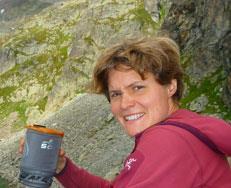Zoë’s vital role involves fieldwork and time spent interpreting data collected from the natural world to minimise our damage to the earth
What is an atmospheric chemistry researcher?

An atmospheric chemist is someone who studies the chemistry of the Earth’s atmosphere. My role as an atmospheric chemist is to study the trends and changes in atmospheric pollutants e.g. air pollutants that can be harmful to humans, plants and ecosystems. There are opportunities to do fieldwork and travel as a lot of the work involves comparing the environment in different places or seeing the changes occurring over time.
What do you do in your job?
A lot of time is spent at the computer, number crunching data, plotting graphs and interpreting the data collected. I also write papers and articles based on my research and have teaching commitments including some outreach activities with students at local schools in order to try and raise awareness of pollution issues. The job involves a fair amount of travel for events and meetings as well as fieldwork.
What do you enjoy most about your job?
I enjoy the challenge of trying to interpret and present the data I find, as well as being able to research and work in an area that I have always felt passionate about. I like the variation of work that my area of interest has taken me on so far.
What attracted you to becoming an atmospheric chemistry researcher?
The natural world fascinates me, trying to understand how it works and how we are affecting it as well as how we can minimise damaging it is exciting. I enjoy numbers, analysing trends and trying to put together data to explain something is something I have always enjoyed. The job is varied and interesting and it is also at the forefront of research so it is fun to be pushing the boundaries. We have to work hard but there are fewer deadlines than in a business-type environment, so you just keep on working on something until it is done, so you do it well.
How did you get in to your job?
I studied in Belgium for a European Baccalaureate with specialism in chemistry, biology, mathematics and experimental chemistry. After school I spent a year studying geography at university in Brussels to improve my French and then a month in Italy, doing a language course. I then went on to study for an MChem in environmental chemistry at the University of Edinburgh. After another year out working at an Oceanography Research Centre in Germany as a marine chemist and teaching English in Germany, I moved to the University of Leicester to do a PhD in atmospheric chemistry. I always took up opportunities to do as much varied fieldwork as possible, even if it was voluntary. It seemed that the times when I was paid the least were always when I did the most exciting things, like going on science cruises as a helper and travelling to the North Pole on an ice-breaker when stepping in to volunteer at the last minute. I also worked as a volunteer for Friends of the Earth and Greenpeace and gained skills which have helped my communication and understanding of where the science fits into the broader picture.
What are the opportunities for career progression?
You can either choose a more academic career that would lead to teaching and supervising. Or as a researcher you can take on projects, as a leader or part of a group and win bids of money to secure your position for a few years at a time. You can always move up the career ladder by doing better science and then you can take on management roles to oversee people and the direction of the science, so plenty of variety and scope.
What advice would you give for people wishing to enter your career area?
Just go for it! Environmental science needs experts from all the different sciences and needs people with good computer, analytical and communication skills. You can move between the different areas of science fairly easily as there is a lot of overlap, so you won’t get bored. You have to use your imagination and look out for opportunities to get to where you want and life can be very interesting. Take up offers of fieldwork, travel the world and stay engaged,if you appear keen, you are much more likely to be offered a job or given another task to do which will broaden your experience.
First published 2014













